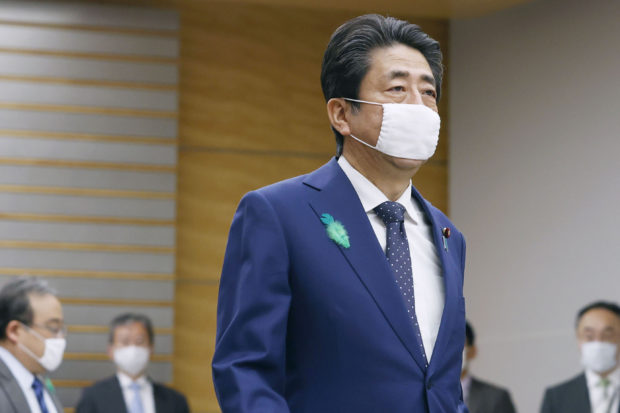
Japanese Prime Minister Shinzo Abe wearing a face mask walks to attend a video conference with executives of Japan’s private companies at his official residence in Tokyo Thursday, April 16, 2020. Abe is considering expanding an ongoing state of emergency to all of Japan from just Tokyo and other urban areas as the virus continued to spread. (Kyodo News via AP)
BANGKOK — Prime Minister Shinzo Abe is planning to expand a state of emergency to all of Japan from just Tokyo and other urban areas as the coronavirus continues to spread.
Abe convened a meeting of experts Thursday to receive approval for the proclamation.
Economy Minister Yasutoshi Nishimura told the meeting that the current partial state of emergency cannot effectively slow the virus because people move in and out of the designated areas.
Abe declared a state of emergency on April 7 that covers Tokyo and six other prefectures deemed at the highest risk. He issued a stay-at-home request only to people in those areas but later expanded it to the rest of the country.
Additional measures, including non-essential business closures, are in place only in Tokyo and the six other prefectures. The measures do not carry penalties.
Abe’s coronavirus response has been criticized for being too slow and too lax. Several local leaders have asked him to include their prefectures as part of the emergency, while others have launched their own measures.
Meanwhile, China is denying allegations that the coronavirus pandemic may have originated in a laboratory near the city of Wuhan where contagious samples were being stored.
Foreign ministry spokesman Zhao Lijian cited the head of the World Health Organization and other unidentified medical experts as saying there is no evidence that transmission began from the lab and there is “no scientific basis” for such claims.
“We always believe that this is a scientific issue and requires the professional assessment of scientists and medical experts,” Zhao said at a daily briefing Thursday.
China also has strongly denied that it delayed announcing the virus outbreak in Wuhan and under-reported case numbers, worsening the impact on the U.S. and other countries. The virus is widely believed to have originated with bats and to have passed via another species to humans at a wildlife and seafood market in Wuhan, although a firm determination has yet to be made.
Allegations of a leak of the virus from the lab have been made in U.S. media without direct evidence and President Donald Trump has vowed to suspend funding for the World Health Organization, partly because of what he says is its pro-China bias.